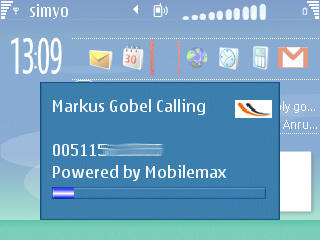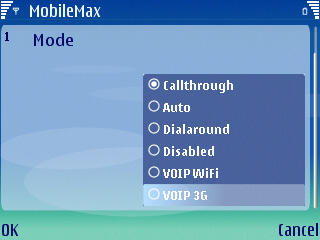I really like the term „minute stealer“ that
Andy Abramson and
Om Malik brought up. It explains in a very short way that VoIP companies like
Jajah,
Rebtel,
Cellity,
Truphone and others take shares of the telephony market from the well established, often monopoly like, old phone companies and make calls cheaper by tunneling them trough the internet. In the last months we should also speak of „mobile minute stealers“ since they do it also with cell phone calls that are even more expensive.
This is a great opportunity and so I wonder why nearly none of the new companies wants to call themselves a „minute stealer“. Are they afraid of waking the sleeping enemy?Last week I researched for an article in a German economy magazine and talked to many important people in this market: Ari Virtanen (Vice President Convergence Products, Multimedia of Nokia), Eric Lagier (Head of Mobile Business Development at
Skype), Roman Scharf (CEO of Jajah), Alexander Straub (co-founder of Truphone), Hjalmar Windbladh (CEO of
Rebtel), Tim von Törne (co-founder of Cellity) and also to analysts, users and cell phone companies. Most of them say that they are no „minute stealers“ and no danger to established cell phone companies.
„A survey showed that 55 per cent of all Skype users never made a international mobile phone call“, told Eric Lagier from Skype. „So Skype is no competition to the mobile operators. If theses people now use Skype mobile to contact their friends abroad this does not take away mobile minutes from the operator.“ He refered to Skype on Wifi PDAs and Skype on mobile phones which „
3“ offers together with an unlimited data deal in the UK and soon in Sweden and Denmark.
A similar contained comment came from Tim von Törne, co-founder of Cellity, which tunnels cell phone calls for small prices trough fixed phone lines: „We don't steal minutes, we only lower the prices.“ The rest of his argumentation was nearly the same like Roman Scharf's from Jajah: „With Jajah the mobile operator does not loose his client. He only does some international mobile calls with us but the operator can still bill him the local calls and the base fee.“ Then he passes the bill to others: „The real threat are Wifi phones because they bypass the mobile operators at all.“
Nicely put. So Nokia, which is the actual market leader for Wifi/GSM mobile phones, must be in trouble with Vodafone, T-Mobile, O2 and other mobile operators. Until now they are Nokia's biggest clients, but the new cell phones like E61, E70 or N81ie make Wifi calls possible and allow the easy installation of services like Jajah and Cellity which must hurt them. Does Nokia leave a sinking ship, with everytime smaller margins in the mobile phone industry, to concentrate with it's Wifi/GSM phones on the office market with its gross margins?
„Nokia has not changed it's strategy“, said Ari Virtanen, Vice President Convergence Products, Multimedia of Nokia. „I cannot see any conflict between Nokia and the mobile operators because of the Wifi capabilities.“ Really? I can't believe it. In Germany you can buy the E61 for 1 Euro together with a cell phone contract. „Most heavy mobile phone users spend 80 per cent of their time in Wifi areas: at home and in the office“, says Harry Behrens, CEO of
4S newcom. „Why should they use then expensive mobile phone connections when they can call with the same device nearly for free on Wifi?“
Sounds logically to me, a perfect „minute stealer“ scenario.
You have to keep in mind that people who download music for free instead of buying it on CD are persecuted and called thiefs. Even if they wouldn't have bought the CD anyway. So in music a person who uses an alternative way to access to songs is a „music stealer“ and a danger to the industry. But in telecommunications a person who uses an alternative way to access to mobile communication for free is no „minute stealer“ and no danger to the industry? Not quite convincing.
I agree more with
Rebtel's Hjalmar Windbladh who said that „today's prices for mobile internet, mobile international phone calls and SMS are a daylight robbery“. Companies like Vodafone pay only 0,8 Euro Cent a minute for a mobile phone call from Germany to China, he explained to me. „So why do they cash 1 Euro or more from their costumers?“. This „toxic pricing“, as Windbladh calls it, brought in the „minute stealers“ like
Rebtel which can connect the same phone call for some Cents. At least Alexander Straub of Truphone was not afraid to tell that „we are building our own network which allows free mobile phone calls worldwide.“
You companies ARE stealing minutes and you do quite a good job in it! When I compare your prices with my normal cell phone costs they can save me between 50 and 90 per cent. Be proud of it and don't hesitat to use the name „minute stealer“!
The network operators have understood your business anyway and they already have you on their radar. Rolf Hansen, CEO of the German MVNO
Simyo even recommends to use Jajah for international calls since he cannot lower their prices in the near future. Vodafone, E-Plus and T-Mobile told me that they don't see you as a danger since you are still so small. But you will not be forever.
But maybe these companies just want to stay under the radar and don't want to attract too much attention. Their businesses live from very small margins on the phone minute. Often it's far less than a Cent. The big companies can push them out of business by just lowering their prices a little bit. Or they do it like AT&T which with one stroke of a feather created the largest unlimited calling community in the US:
100 million AT&T wireless and wireline phone numbers can call each other now for free.
Who will install then the software of the „minute stealers“ on his mobile phone?

